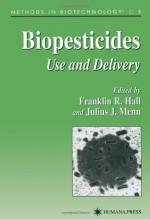|
This section contains 528 words (approx. 2 pages at 300 words per page) |

|
The word "pesticide" is a broad term that refers to any device, method, or chemical that kills plants or animals that compete for humanity's food supply or are otherwise undesirable. Pesticides include insecticides, fungicides, herbicides, nematocides (used to kill nematodes, elongated cylindrical worms), and rodenticides. Of these various pesticides, insecticides have a longer and more noteworthy history, perhaps because the number of insects labeled "pests" greatly exceeds the number of all other plant and animal "pests" combined. Hence, this article focuses on the use of agricultural insecticides.
Since they first began cultivating crops (around 7000 B.C.) if not before, humans have devised methods to prevent insects from eating or otherwise destroying precious crops. Some cultures relied on the practice of planting during certain phases of the moon. Other early agricultural practices that indirectly kept insect populations low were rotating crops; planting small, varied crops; and selecting naturally resistant...
|
This section contains 528 words (approx. 2 pages at 300 words per page) |

|


